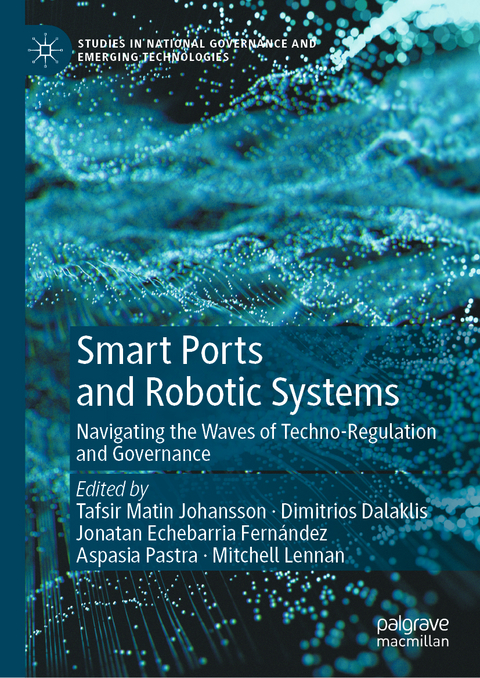
Smart Ports and Robotic Systems
Springer International Publishing (Verlag)
978-3-031-25295-2 (ISBN)
This book provides a comprehensive overview of smart ports and remote technologies in the maritime industry. It demonstrates how modern advances in artificial intelligence and robotics have transformed the shipping industry, and assesses the impact of this technology from a law and governance standpoint. The book covers a range of topics including port autonomous operations systems, cybersecurity, big data analytics, digitalization and blockchain to throw light on the opportunities and benefits of these new technologies in improving security and safety. It also considers the challenges and threats of their application. It concludes by examining the trajectory of national and international regulatory developments. The book will appeal to scholars and students of maritime technology, law and governance, as well as practitioners and policymakers.
Chapters 8, 19 and 20 are available open access under a Creative Commons Attribution 4.0 International License via link.springer.com.
lt;p>Tafsir Matin Johansson is Assistant Professor at the World Maritime University-Sasakawa Global Ocean Institute, Sweden.
Dimitrios Dalaklis is Professor of Safety and Security at the World Maritime University, Sweden.
Jonatan Echebarria Fernández is Honorary Lecturer at The City Law School, City, University of London, UK.
Mitchell Lennan is Assistant Professor in Energy and Environment Law at the University of Aberdeen, UK.
Chapter 1: Introduction to Smart Ports & Robotic Systems: Navigating the Waves of Techno-regulation & Governance.- Part I: Setting the Scene.- Chapter 2: The Possibilities of Ocean Innovation Diplomacy to Promote Transnational Innovation Ecosystems for the Maritime Sector.- Part II: Vessel Autonomy & Autonomous Systems Redux.- Chapter 3: "Utopia at Sea" from the Captain's Chair: Are Autonomous Ships the Real Solution to Human Error?.- Chapter 4: Changing Ocean Observation and Cargo Carrying with Disruptively Affordable, Long Duration Autonomous Vessels - Case Study: SubSeaSail LLC.- Chapter 5: Crowdsourced Bathymetry and Automation: An Evolutionary Process to Improve the Means of Navigation.- Chapter 6: The Use of Marine Autonomous Systems in Ocean observation under the LOSC: Maintaining Access to and Sharing Benefits for Coastal States.- Part III: Smart Ports.- Chapter 7: Implications of Technological Innovation and Respective Regulations to Strengthen Port & Maritime Security: An International Agenda to Reduce Illegal Drug Traffic for Countering Terrorism at Sea.- Chapter 8: Automated Port Operations: The Future of Port Governance.- Chapter 9: Canada's Rapidly Evolving Smart Ports .- Chapter 10: Concession Based Project Finance for Smart Ports with a Special Focus on Emerging Economies.- Chapter 11: Smart Port State Enforcement through UAVs: New horizons for the Prevention of Ship Source Marine Pollution.- Chapter 12: Digitalization and Cyber Physical Security Aspects in Maritime Transportation and Port Infrastructure.- Chapter 13: Port Cybersecurity: Balancing Evolving Regulatory Compliance with Enterprise Risk Management.- Chapter 14: Opportunities and Challenges in relation to Big Data Analytics for the Shipping and Port Industries.- Part IV: Remote Inspection Techniques.- Chapter 15: Remote Inspections Scheme on Tanker Vessels during Covid-19 Pandemic.- Chapter 16: Techno-regulatory Challenges for Remote Inspection Techniques (RIT): The Role of Classification Societies.- Chapter 17: Remote Inspection Schemes: Past, Present & Future.-Chapter 18: Human-Autonomy Teaming in Ship Inspection: Psychological Perspectives on the Collaboration Between Humans and Self-Governing Systems.- Chapter 19: Lessons Learned from Maritime Nations Leading Autonomous Operations & Remote Inspection Techniques.- Chapter 20: Towards an International Guideline for RIT End-users: Spearing Through Vessel Inspection and Hull Cleaning Techno-regulatory Elements.- Part V: Tying the Threads.- Chapter 21 Smart Ports and Robotic Systems: Where is it all going from here?
| Erscheinungsdatum | 06.04.2023 |
|---|---|
| Reihe/Serie | Studies in National Governance and Emerging Technologies |
| Zusatzinfo | XXXIV, 414 p. 41 illus., 30 illus. in color. |
| Verlagsort | Cham |
| Sprache | englisch |
| Maße | 148 x 210 mm |
| Gewicht | 680 g |
| Themenwelt | Sozialwissenschaften ► Politik / Verwaltung ► Staat / Verwaltung |
| Schlagworte | Law and Governance • maritime affairs • Maritime autonomy • Remote technologies • Smart ports • Techno-regulations |
| ISBN-10 | 3-031-25295-0 / 3031252950 |
| ISBN-13 | 978-3-031-25295-2 / 9783031252952 |
| Zustand | Neuware |
| Haben Sie eine Frage zum Produkt? |
aus dem Bereich


